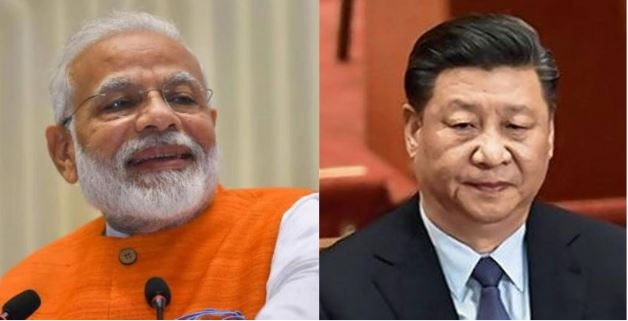Adolf Hitler devoted two chapters in his controversial book ‘Mein Kampf’ to study and practice the art of propaganda. However, in the modern, globalized world, the communist state of China has taken the propaganda warfare a notch above. Beijing loathes the presence of a strong leader like Prime Minister Narendra Modi in its vicinity and, therefore, continuously tries to manufacture border issues as a way to destabilize the government in the centre and bring its old-allies like Congress into power, which CCP’s mouthpiece Global Times has heaped praises upon.
Conversely, China’s attempts to destabilize the Modi government have backfired gloriously. Beijing thought it could arm-twist India into submission in the Galwan valley at the LAC in June, but, what happened there served as a cold-reminder to the wussies of PLA that India was capable of giving it back in epic proportions even when blindsided. Several media reports had estimated that around 50-60 PLA troops had succumbed to the fatal blows levied by the brave hearts of the Indian army.
Evidently, Beijing did not anticipate such a stellar response and had to cover up the deaths of its soldiers as pressure mounted from its own citizens who demanded to know the fate of their countrymen.
The Union government always wanted to boycott Chinese products and investments and thus the June 15 incident served as the perfect jumping-off point. India came down heavily on the Chinese espionage apps and quashed their existence in one of the biggest markets of the planet. The banning of the apps served as a guidebook for the other countries and the USA used it to give an ultimatum to TikTok to pack its bags and leave the country.
A few days back, New Delhi came down yet again on the Chinese apps and banned 117 espionage apps including the widely popular PUBG-Mobile. Reported by TFI, China which takes pride in having leverage in any situation was made to eat the humble pie when PUBG’s parent Korean company, Bluehole, yesterday, announced that it was severing its ties with Tencent in a hope to start operations in India again.
It is anticipated that the massive ban on Chinese tech services/apps by India will also result in investors growing apprehensive of putting in their fortunes with Chinese companies, as in the post-COVID world order, no one knows which country might end up taking anti-China decisions. Instead, investors will be looking at putting their money in more stable economies, such as India, who face no negative sentiments globally. This will spell the death knell for the Chinese tech sector.
The recent SCO meeting in Russia was also a prime example of India’s water-tight foreign diplomacy. Reports have stated that the Chinese Defence Minister was pressurized by Russia to hold a meeting with his Indian counterpart.
India has so far given China a taste of its own medicine that Beijing so far hasn’t been able to gulp it down. India’s old ally Russia also came near the Strait of Malacca–China’s Achilles heel–and conducted a naval exercise with India.
It was through India’s backdoor diplomatic dealings with Russia that the consignment of the S-400 air missile system was suspended to China.
India capturing a strategically important post in Pangong-Tso has further riled the Xi Jinping red authoritarian regime which funnily enough, is now using medieval-weapons to take on the battle-hardened soldiers of the Indian army.
Moreover, the sacrifice of a Tibetan SFF JCO Nyima Tenzin in the battle on August 29-30 has become a rallying point for Tibetans all over the world and sparked a new life to the resistance against the Chinese occupation of the region.
And it is not only China that has tried its best to corner the Modi government. India’s two biggest enemies’ viz. Pakistan and Turkey had also mounted a weak social media campaign in the past few weeks, thinking it was going to put a dent into PM Modi’s popularity.
The video of his address on the PMO, PIB, and BJP channels of YouTube was garnering more dislikes than likes, something which has never happened before. The same was attributed by many usual Modi-baiters as an outburst and uprising against the Modi government by a disgruntled student community which was being made to sit for the JEE and NEET entrance tests.
However, as it turns out, only two per cent of the dislikes on YouTube for this Sunday’s Mann Ki Baat came from India, and a whopping 98 per cent of them could be sourced to countries abroad, IANS reported.
It is only expected that on such occasions when PM Modi is to be targeted under the aegis of a fake social media campaign, Pakistanis lend a helping hand for the same without asking any questions.
Turkish participation, albeit fake in nature, is in larger sync of apprehensions raised by India’s security establishment regarding the newly turned extremist country under a rabid wannabe Khalifa – RecepTayyip Erdogan.
It has been found that Turkey is funding anti-India activities extensively, and the participation of the country’s bots and Twitter users to target PM Modi and the BJP has grown manifold. It will not come as a surprise if it were to be revealed that Turkey and Pakistan were in cahoots to wage a ‘dislike’ war against Prime Minister Modi on YouTube.
Due to the China incident, a new pro-Modi wave can be seen among the Indians. Everyone is aware of Modi’s harsh policies against China since the Galwan valley clash took place. Therefore, China unknowingly has done a small PR campaign for the current regime. China is digging a hole for itself, all while being in the stupor that it is taking on PM Modi’s popularity—which on the contrary is only swelling.
